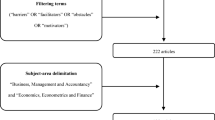Abstract
Identification of every phenomenon in the world implies the application of a proper theoretical framework. In doing so, the various approaches of analysis have been used in different fields of study. In the last two decades, with the rapid growth of scientific and technical knowledge, signs of the third wave of economic revolution have gradually come to view. Although the new economic pattern has its own challenges, having relevant documents in mind, yet new opportunities and solutions proposed by the emerging revolution, owing to the significant increase in growth rate and productivity, have had great potential to meet the economic problems of the contemporary world. The current study seeks to find a powerful and efficient theoretical pattern in order to specify the best relations that govern the economic factors of the new era.
The theoretical framework has been based upon the institutional economics; also, a descriptive-analytical method has been applied to analyze the information. The purpose is to find an efficient theoretical pattern to achieve the aforementioned. Indeed, the most important findings of the current research are the following: (1) the knowledge-based economy is facing four major challenges: new waves of increasing uncertainty; increasing importance of human as well as factors affecting his motivation and selection process such as social capital; market failure due to the factors that are agreed upon, such as increasing return to scale and the severe increase in inequality; and the double importance of social changes owing to the institutional reforms. (2) The aforementioned challenges are all of the institutional nature. Hence, a doctrine, which lacks enough consideration toward institutional issues, would be unable to analyze and fully understand the knowledge-based economy. The findings of this paper show that the most apt theoretical framework to analyze the issues related to the knowledge-based economy is the one which is eligible and efficient enough to analyze and scrutinize the institutions and the causal relations between them.




Similar content being viewed by others
References
Arrow, K. J. (1959). Economic welfare and the allocation of resources for invention. California: The Rand-Corporation.
Bloomberg. (2013). Facebook may be more expensive than Google. http://mobile.bloomberg.com/news/2012-02-01/shares-of-facebook-may-be-five-times-as-expensive-as-google-s-in-offering.html Accessed 10 Dec 2013
Carayannis, E. G., & Campbell, D. F. J. (2009). ‘Mode 3’ and ‘Quadruple Helix’: toward a 21st century fractal innovation ecosystem. International Journal of Technology Management, 46(3), 201–234.
Carayannis, E. G., & Campbell, D. F. J. (2010). Triple helix, quadruple helix and quintuple helix and how do knowledge, innovation, and environment relate to each other? a proposed framework for a trans disciplinary analysis of sustainable development and social ecology. International Journal of Social Ecology and Sustainable Development, 1(1), 41–69.
Castells, M. (2000). The rise of network society. Oxford: Blackwell.
Edquist, C. (2004). Innovation system: a critical review of the state of the art. In J. Fagerberg, D. Mowery, & R. Nelson (Eds.), Handbook of innovation (Ch7). Oxford: Oxford University Press.
Godin, B. (2003). The knowledge-based economy: conceptual framework or buzzword? (Working paper: No.24).
Hall, S., & Greben, B. (1992). Formation of modernity (pp. 275–331). Cambridge: Polity Press.
Hodgson, G. M. (1998). The approach of institutional economics. Journal of Political Literature, 36, 166–192.
Jenson, B., Johnson, M., Lorenz, B., Lundvall, E., & Ake, B. (2007). Forms of knowledge and modes of innovation. Research Policy, 36, 680–693.
Klein, P. G. (1999). New institutional economics. In E. Elgar, B. Boudewijn, & G. Degeest (Eds.), Encyclopedia of law & economics. Cheltenham: Edward Elgar.
Layard, P. R. G., & Walters, A. A. (1987). Microeconomic theory. New York: McGraw-Hill Book Company.
Leydesdorff, L. (2012). “The Triple Helix, Quadruple Helix, …, and an N-tuple of helices: explanatory models for analyzing the knowledge-based economy?”. Journal of the Knowledge Economy, 3(1), (Forthcoming), http://www.springerlink.com/content/x543613918677871/ . Accessed 10 Dec 2013.
Meier, G. M. (2000). The Old generation of development economic and the New (Frontiers of economic development: the future in prospective). Oxford: Oxford University Press.
North, D. C. (1981). Structure and change in economics history. New York: Norton.
North, D. C. (1990). Institutions, institutional change and economic performance. Slovene: Cambridge University Press.
North, D. C. (1993). The new institutional economics & development. http://ideas.repec.org/p/wpa/wuwpeh/9309002.html. Accessed 10 Dec 2013.
North, D. C. (1994). Economic performance through time. American Economic Review, 84(3), 359–68.
North, D. C. (2005). Understanding the process of economic change. Princeton: Princeton University Press.
North, D. C., & Davis, L. (1970). Institutional change and american economic growth: a first step towards a theory of institutional innovation. Journal of Economic History, 30(N01), 131–146.
OECD. (1996). The knowledge based economy (pp. 96–102). Paris: General Distribution: OECD/GD.
Pohlman, M. (2005). The evaluation of innovation: cultural background and the use of innovation models. Technology Analysis and Strategic Management, 17(1), 9–19.
Rifkin, J. (1996). End of work. New York: G.P. Putnam’s Son.
Smith, K. (2000). What is the knowledge economy? Knowledge intensive industries and distributed knowledge bases (Prepared as part of the project “Innovation Policy in a Knowledge-Based Economy”). Brussels: Commissioned by the European Commission.
Stiglitz, J. E. (1999). Public policy for a knowledge based economy. London: Remarks at the Department for Trade and Industry and Center for Economic Research. http://www.worldbank.org/htm1/extdr/extme/jsspo12799a.htm. 21 Jan 2012.
Uphoph, D. D. (1999). Understanding social-capital: learning from the analysis and the experiences of participation. In P. Dasgupta & I. Serajoddin (Eds.), Social-capital: a-multifacted perspective. Washington: World Bank.
Waters, M. (2001). Globalization (2nd ed.). London: Routledge.
Williamson, O. E. (2000). The new institutional economics: tacking stock, looking ahead. Journal of Economic Literature, 38, 595–613.
Author information
Authors and Affiliations
Corresponding author
Rights and permissions
About this article
Cite this article
Fathollahi, Momeni, F., Elahi, N. et al. Appropriate theoretical framework for understanding and analyzing economic issues in knowledge-based economy. J Knowl Econ 8, 957–976 (2017). https://doi.org/10.1007/s13132-015-0307-y
Received:
Accepted:
Published:
Issue Date:
DOI: https://doi.org/10.1007/s13132-015-0307-y




